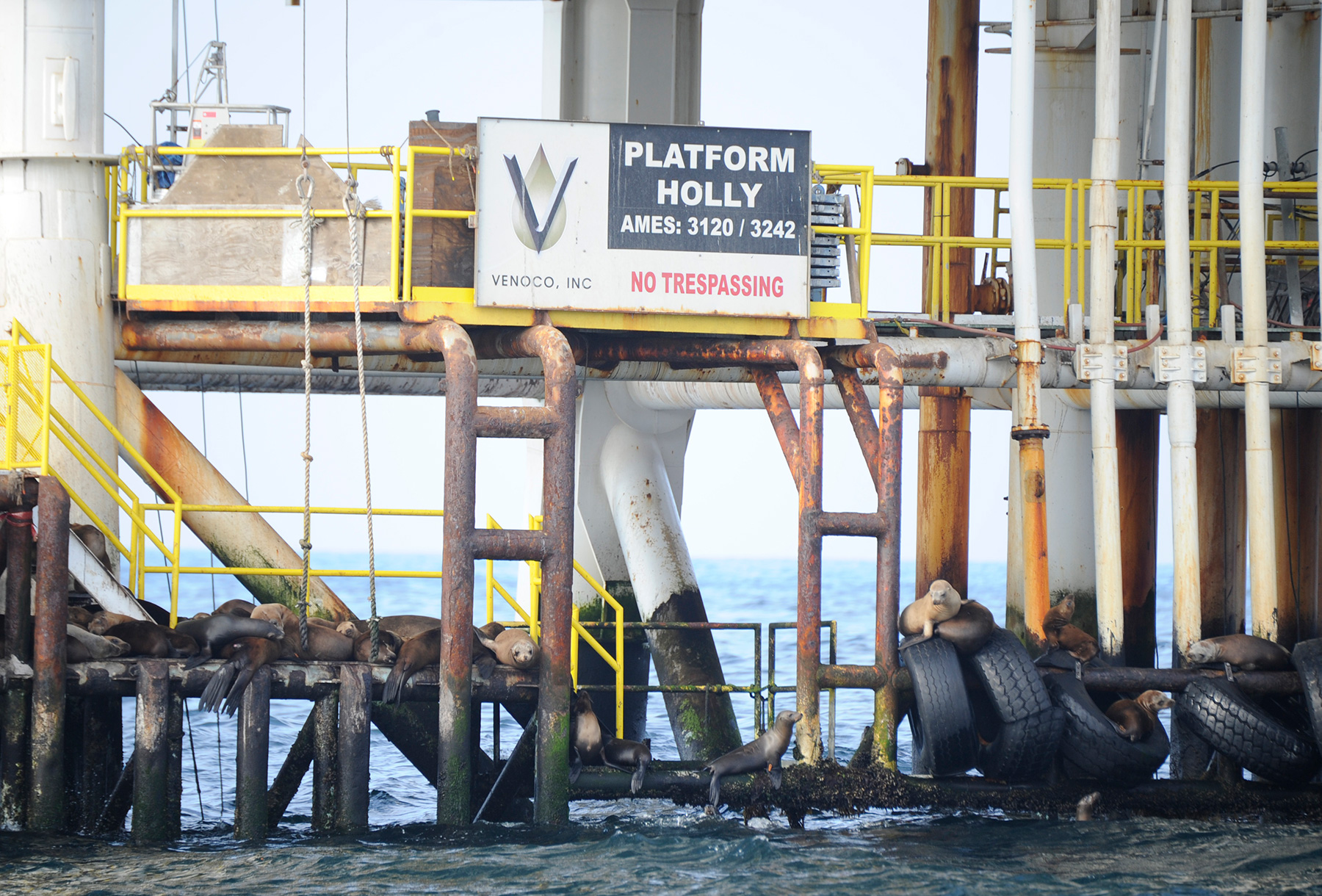Removal Process of Platform Holly Begins
County Supervisors Weigh in on the Future of Oil Around Santa Barbara

Three area government entities have begun the arduous process of removing the offshore platform, onshore facility, and pipeline that recently belonged to Venoco, the now-defunct oil company that went bankrupt. Plugging the wells and dismantling Platform Holly will cost more than $100 million, which county officials announced Tuesday would be paid for in part by ExxonMobil. The oil company previously owned the Venoco oil and gas infrastructure.
Platform Holly had been shut down for more than two years because the Plains All American pipeline that transported its oil north had ruptured in the Refugio Oil Spill. Federal regulators ordered Line 901 to be purged and filled with inert gas. (The same is true for six other offshore platforms.) Venoco, a company that originated in Carpinteria, declared bankruptcy and abandoned plans to expand its production. As a legal entity, the company “ceases to exist,” explained county energy expert Errin Briggs.
So the government has stepped in. The State Lands Commission is drafting a three-year plan to handle the mothballed oil platform. The City of Goleta now oversees the Ellwood Onshore Facility. The County of Santa Barbara is handling the underwater pipeline connecting Platform Holly with the ruptured Plains pipeline. Plains has submitted an application to rebuild the emptied Line 901 with a “new, smaller diameter steel pipeline”; county energy staff has deemed the application incomplete. The demolition of a nonoperational marine terminal located on UC Santa Barbara’s Devereux property has been transferred to the university, according to county records. Exactly how much the total dismantling will cost and how much the government will have to front remains wildly speculative, Briggs said.
On Tuesday, the county supervisors also reviewed the violation reports of more than 2,450 oil wells and 125 accompanying facilities. Each supervisor expressed varying degrees of disappointment with the biggest offender. Greka Energy, which was founded nearly 20 years ago in Santa Barbara County, accounted for 145 out of 161 violations issued in a roughly three-year period.

Nearly a decade ago, Greka was the subject of a series of serious local and federal penalties for numerous oil spills. At the time County Supervisor Janet Wolf pushed to publicize those accusations. On Tuesday, she called for greater scrutiny of the oil industry. Her conservative colleague Steve Lavagnino, however, noted that some of the “violations” are more like fix-it tickets, which “almost sends a false alarm.” “I’d really like to know how many of those are significant,” he said. He also made a point of how many of the 2,500 wells Greka owned. The answer is about 25 percent, said Planning & Development Assistant Director Dianne Black. She also noted Greka has experienced “staffing issues” this year.
The report stated five oil spills have occurred this year, through September. Last year, there were a total of four spills, amassing 37 barrels of crude oil or produced water. In 2015, there were nine spills, amassing 114 barrels.
The hearing was void of talk about oil tax revenue, lamented conservative taxpayer advocate Joe Armendariz. He stressed the firefighters putting their lives on the line for the Thomas Fire, burning on 45,000 acres of Ventura land on Tuesday afternoon. “Fighting these fires costs money,” he said. Refuting this argument was Linda Krop, chief counsel at the Environmental Defense Center, who argued oil projects “leave taxpayers to clean up their mess.”
The conversation evolved into a larger debate about society’s reliance on oil and gas. A clear split in opinion exists among boardmembers. Liberal Democrat Das Williams expressed willingness to kick the collective oil addiction. Lavagnino, who represents the Santa Maria area, likened the environmentalists’ argument to “a guy smoking a cigarette calling for an end to the tobacco industry.”
Right-wing County Supervisor Peter Adam said he tried to keep quiet, “but it’s just gotten too much for me.” He opined it might be feasible to get off fossil fuels in “200 or 500 years … but not in our lifetime.”
The feud was rather predictable, but it offers a glimpse into the thought process of the decision makers. The county supervisors will be voting on the fate of 750 onshore cyclic steaming oil wells in the North County oil field called Cat Canyon. The oil companies involved include Aera Energy, ERG, and PetroRock. Should they be approved, the county’s oil well portfolio would increase by about 30 percent.


